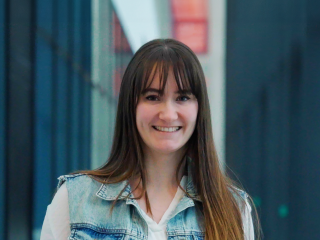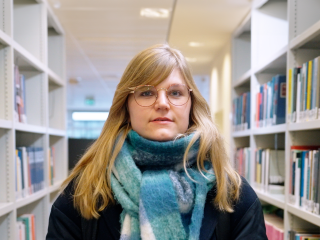Clinical Neuropsychology
Become an expert on the relationship between the brain and behavior. Clinical Neuropsychology operates at the crossroads of various psychological disciplines, such as clinical (neuro)psychology, clinical neuroscience, and applied neuroscience. You will examine the neurological and neuropsychological characteristics of the most common neurodevelopmental disorders and brain conditions. This program is a track of the MSc Psychology and Mental Health (Psychologie en Geestelijke Gezondheid).
QS World University Rankings by Subject, 2024
National Alumni Survey, 2021 | n =26
Times Higher Education Ranking, 2024
Program and courses
Study the neurological and neuropsychological aspects of the most common neurodevelopmental disorders and brain conditions, as well as the normal and pathological age-related changes in cognition, behavior, and brain. You will study these disorders and changes from the perspective of various psychological disciplines, such as clinical (neuro)psychology, clinical neuroscience, and applied neuroscience.
- Address disorders such as epilepsy, autism, ADHD, Alzheimer’s disease, Parkinson’s disease, and cerebrovascular diseases. The emphasis throughout the program lies on the biological origins and the brain mechanisms underlying these disorders.
- Acquire in-depth knowledge and skills in both neuropsychological assessment and rehabilitation. Learn to conduct independent research in the field of clinical neuropsychology using state-of-the-art neuroscientific methods with the scientist-practitioner model.
- You will do an internship, which can be external or internal.
- During the external internship you will work for an institution that cares for patients with neuropsychological complaints. These institutions include rehabilitation centers and institutions for general healthcare, elderly care, and youth care.
- During an internal internship, you will work in a neuropsychological laboratory at Tilburg University.
- If you do an external internship in the Netherlands, you can acquire the basic registration of psychodiagnostics (BAPD) and fulfill the criteria for the registration of the association LOGO (Vereniging Landelijk Overleg Geestelijke Gezondheidszorg Opleidingsinstellingen). This also gives you a good connection to the postgraduate GZ training.
Typical courses are:
- Developmental Neuropsychology
- Neuropsychology of Aging
- Assessment for Clinical Neuropsychology
- Neuropsychological Rehabilitation
-

John
Master's student"This program combines clinical practice with a scientific background, which helps me apply certain strategies that support my clients in the best possible way. "
-

Marjolein
Master's student"I like that the teaching material is applied to the clinical perspective of neuropsychology. With your thesis, you have the possibility to choose either a clinical or scientific research focus."
-

Andra
Master's student"During my internship, I experienced that working with patients brings responsibility, but also a lot of joy."
Career prospects
Alumni can easily find a job after graduation, due to the shortage of clinical neuropsychologists in the Netherlands and Europe. As a psychologist, trained in clinical neuropsychology, you cover a broad field of expertise, which means you can be employed in the broad domain of mental health services, politics and schools.
- In mental health care institutions you will attend to patients in the acute (hospital) stage, and in the chronic phases, as a result of disorders and diseases like stroke, brain tumors or traumatic brain injury.
- In the generalistic basic healthcare, your expertise as a clinical neuropsychologist will bridge the gap between clinical psychologists and psychiatrists.
Example positions of graduates
- Clinical Neuropsychologist at Helios Kliniken
- Psychologist at Surplus
- Neuropsychologist at University of Gent, Belgium
Alumni facts
- On average 2 months until first paid job
- 100% would choose the same Master’s program again, at the same university
- Average gross monthly salary one year after graduation: €2,929.-
- 96% is (very) satisfied with this program
Source: National Alumni Survey, 2021 | n = 26

Application and admission
This Master's program starts:
End of August
Best preparatory programs:
Psychology with a specialization in, for example:
|
|
Tuition fees and scholarships
International students, please find all information about the tuition fees and the scholarships available.
Interested in this Master's track?

More information on this Master's program
Create your own e-brochure with information on program content, admission requirements, career prospects, and student life in Tilburg. Throughout the year you can take part in various types of events: on-campus, abroad or online.
-
16:00 - 17:00
Housing - Live webinar for Bachelor's and Master's students
Interested in finding accommodation in Tilburg as you get ready to start your studies? Join our interactive Live Webinar on Housing on April 25. Meet our international team and learn more about the city. You can join the 1-hour webinar either at 10:00 or 16:00 CEST.
-
13:30 - 15:45
Campus Experience
Are you curious about life as a student at Tilburg University, or not sure which university you want to attend? Join our Campus Experience on Wednesday
May 8! Discover our compact and green campus with one of our students and find out if Tilburg University is your future home. -
To be announced
Master's Open day
Are you interested in doing a Master's program? Do you want to specialize or are you looking for a Master that broadens your possibilities? Join us at the Master's Open day on November 16 to find out which (pre-)Master's program suits you best. Learn all about our (pre-)Master’s programs and tracks, and ask teachers, students, and education coordinators your questions.
Interested in the MSc track Clinical Neuropsychology?
Check your eligibility and the deadlines for application







